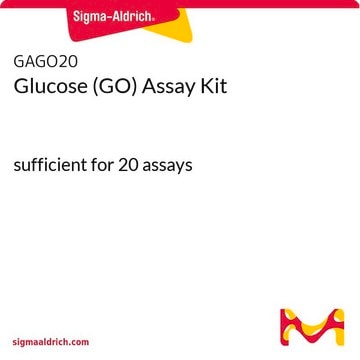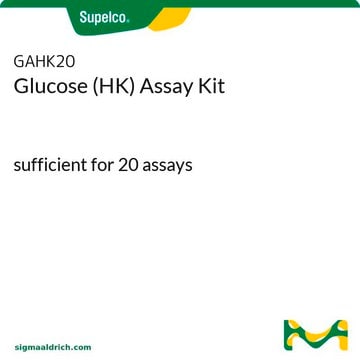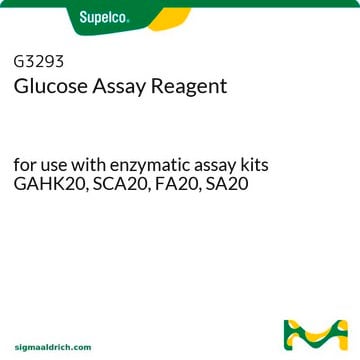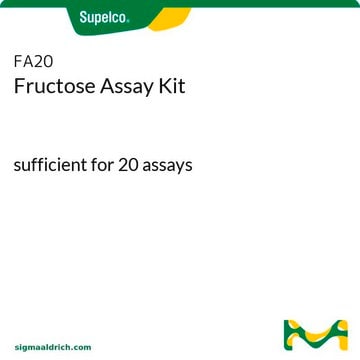CBA086
Glucose Assay Kit
Autenticatiper visualizzare i prezzi riservati alla tua organizzazione & contrattuali
About This Item
Codice UNSPSC:
41122100
Prodotti consigliati
impiego
sufficient for 100 tests
Livello qualitativo
Confezionamento
pkg of 1 96-well plate(s)
Produttore/marchio commerciale
Calbiochem®
Condizioni di stoccaggio
OK to freeze
Metodo di rivelazione
colorimetric
fluorometric
Condizioni di spedizione
wet ice
Temperatura di conservazione
−20°C
Descrizione generale
Glucose (C6H12O6; FW: 180.16) is a very important fuel source for generating universal energy molecules ATP. Glucose level is a key diagnostic parameter for many metabolic disorders. Measurement of glucose can be very important in both research and drug discovery processes.
The Glucose Assay kit provides direct measurement of glucose in various biological samples (e.g. serum, plasma, body fluids). Glucose enzyme mix oxidizes glucose to generate a product which reacts with a dye to produce color and fluorescence. The generated color or fluorescence is proportional to the amount of glucose in the sample.
Componenti
Glucose Assay Buffer, Glucose Probe, Glucose Enzyme Mix, and Glucose Standard, and a user protocol.
Attenzione
Toxicity: Multiple Toxicity Values, refer to MSDS (O)
Principio
The Glucose Assay Kit provides direct measurement of glucose in various biological samples (e.g., serum, plasma, body fluid, food, growth medium, etc.). The method is rapid, simple, sensitive, and suitable for high throughput. The assay is also suitable for monitoring glucose levels during fermentation and glucose feeding in protein expression processes.
Nota sulla preparazione
• Glucose Enzyme Mix: Dissolve the Glucose Enzyme Mix in 220 µl Glucose Assay Buffer. Aliquot and store at -20°C. Use within two months.
• Glucose Probe: Supplied ready to use. Warm to room temperature to thaw the DMSO.
• Standard Curve: For colorimetric assay, dilute the Glucose Standard to 1 nmol/ml by adding 10 µl of the Glucose Standard to 990 µl of Glucose Assay Buffer, mix well. Add 0, 2, 4, 6, 8, 10 µl into each well individually. Adjust volume to 50 µl/well with Glucose Assay Buffer to generate 0, 2, 4, 6, 8, 10 nmol/well of Glucose Standard. For fluorometric assay, dilute the Glucose Standard solution to 0.1 nmol/µl by adding 10 µl of the Glucose Standard to 990 µl of Glucose Assay Buffer, mix well. Then take 20 µl into 180 µl of Glucose Assay Buffer. Mix well. Add 0, 2, 4, 6, 8, 10 µl into each well individually. Adjust volume to 50 µl/well with Glucose Assay Buffer to generate 0, 0.2, 0.4, 0.6, 0.8, 1.0 nmol/well of the Glucose Standard.
• Glucose Probe: Supplied ready to use. Warm to room temperature to thaw the DMSO.
• Standard Curve: For colorimetric assay, dilute the Glucose Standard to 1 nmol/ml by adding 10 µl of the Glucose Standard to 990 µl of Glucose Assay Buffer, mix well. Add 0, 2, 4, 6, 8, 10 µl into each well individually. Adjust volume to 50 µl/well with Glucose Assay Buffer to generate 0, 2, 4, 6, 8, 10 nmol/well of Glucose Standard. For fluorometric assay, dilute the Glucose Standard solution to 0.1 nmol/µl by adding 10 µl of the Glucose Standard to 990 µl of Glucose Assay Buffer, mix well. Then take 20 µl into 180 µl of Glucose Assay Buffer. Mix well. Add 0, 2, 4, 6, 8, 10 µl into each well individually. Adjust volume to 50 µl/well with Glucose Assay Buffer to generate 0, 0.2, 0.4, 0.6, 0.8, 1.0 nmol/well of the Glucose Standard.
Prepare test samples in a total volume of 50 µl/well with Glucose Assay Buffer. Serum can be directly diluted in Glucose Assay Buffer; typically 0.5-2 µl/assay is sufficient (normal serum contains ~5 nmol glucose/µl). We suggest testing several doses of your sample to make sure the readings are within the standard curve range.
Stoccaggio e stabilità
Upon arrival store the entire contents of the kit at (-20°C). Protect from light. Note: Allow reagents warm to room temperature and briefly centrifuge vials before opening.
Altre note
Lee, Y.S. et al. 2007.Diabetes56, 1671.
Note legali
CALBIOCHEM is a registered trademark of Merck KGaA, Darmstadt, Germany
Esclusione di responsabilità
To comply with ban of sale of mercury-added products required by The Interstate Mercury Education and Reduction Clearinghouse (IMERC), this product is prohibited to be sold in the following US states: Rhode Island and Connecticut.
Codice della classe di stoccaggio
10-13 - German Storage Class 10 to 13
Certificati d'analisi (COA)
Cerca il Certificati d'analisi (COA) digitando il numero di lotto/batch corrispondente. I numeri di lotto o di batch sono stampati sull'etichetta dei prodotti dopo la parola ‘Lotto’ o ‘Batch’.
Possiedi già questo prodotto?
I documenti relativi ai prodotti acquistati recentemente sono disponibili nell’Archivio dei documenti.
Sri Teja Mullapudi et al.
eLife, 7 (2018-12-07)
Pathways modulating glucose homeostasis independently of insulin would open new avenues to combat insulin resistance and diabetes. Here, we report the establishment, characterization, and use of a vertebrate 'insulin-free' model to identify insulin-independent modulators of glucose metabolism. insulin knockout zebrafish
Megan R Kwon et al.
PeerJ, 6, e4472-e4472 (2018-03-13)
C1q TNF related protein 3 (CTRP3) is a relatively novel hormonal factor primarily derived from adipose tissue and has anti-diabetic properties. To determine if CTRP3 could play a role in early childhood development, the purpose of this study was to
Renata Goncalves et al.
Comparative biochemistry and physiology. Part A, Molecular & integrative physiology, 260, 111019-111019 (2021-06-20)
Optimal rearing temperatures for European lobster Homarus gammarus in aquaculture differ from those prevalent in their aquatic ecosystems and acclimating juveniles to the prevailing temperatures before release may aid in the success of re-stocking programs. As the dietary nutritional composition
Fei Liu et al.
Journal of cell communication and signaling, 16(1), 103-113 (2021-07-02)
Nasopharyngeal carcinoma (NPC) is the most common malignant tumor of the head and neck region and is characterized by an increased risk of developing chemoresistance after treatment. The present study demonstrated that estrogen-related receptor α (ERRα) was upregulated in cisplatin-
Lucas M Wiggenhauser et al.
Diabetes, 69(5), 1020-1031 (2020-03-07)
Progression from the initial vascular response upon hyperglycemia to a proliferative stage with neovacularizations is the hallmark of proliferative diabetic retinopathy. Here, we report on the novel diabetic pdx1 -/- zebrafish mutant as a model for diabetic retinopathy that lacks
Il team dei nostri ricercatori vanta grande esperienza in tutte le aree della ricerca quali Life Science, scienza dei materiali, sintesi chimica, cromatografia, discipline analitiche, ecc..
Contatta l'Assistenza Tecnica.





